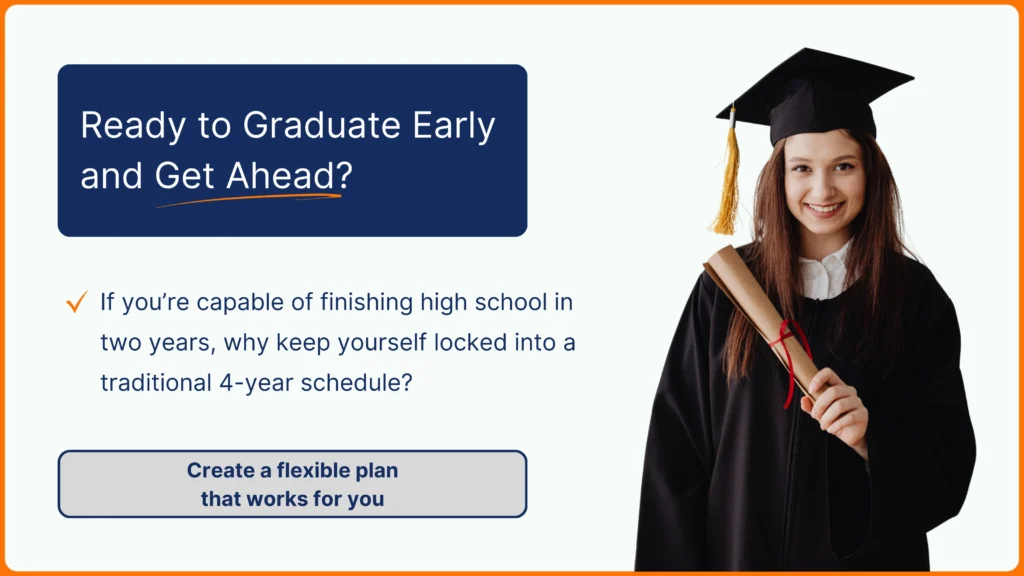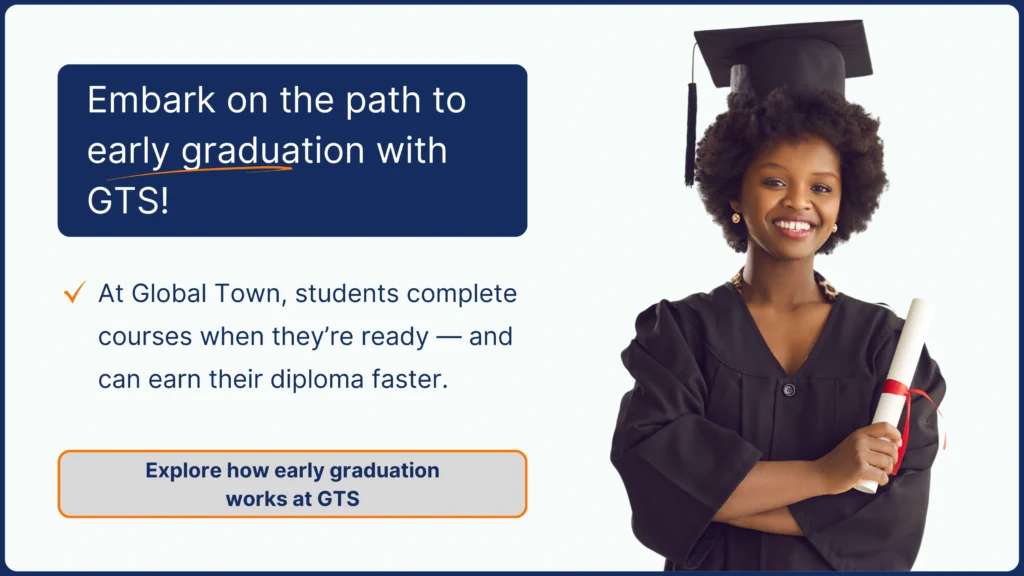In the current competitive job market, you cannot afford to miss an opportunity to excel in your college education or career. One of the first things that might come to the mind of a young student is graduating high school early to get an extra year to focus on personal and professional growth. Graduating early requires careful planning and is not simply about gaining extra time.
In this article, we will clarify all of your questions regarding graduating early. Is graduating high school early hard? What does it take to be among the few who complete their high school diploma earlier than average students? What is at risk here, and how can we maintain balance in life while finishing high school early? Let’s explore these topics in detail.
What does it mean to graduate High School early?
“Graduating high school early” means earning the High School Diploma in less than four years by completing all essential course requirements. Most students who graduate early achieve this goal in three or three and a half years.
The exact meaning of this academic accomplishment may vary from one institution to another, but the overall idea remains almost the same. If you have an actionable plan to graduate faster than the allotted four years, you must focus on leaving high school during junior year or halfway through senior year.
Early graduates receive their diplomas before their peers, but they also put in more work to complete four years of work in 3 years. Planning, self-discipline, motivation, and hard work are some major contributors to early graduation.
At GTS, students can study at their own pace, finish one course, and move on to the next without waiting for anyone else. They can study anytime, anywhere, and any way that works for them.
Why do students want to graduate from high school early?
Why would you like to go down this route? Are you seeking to transition from the classroom to the workforce sooner? Do you want to join the military, or do you have plans to take some other courses right after your diploma?
There are many personal and academic reasons why someone might want to graduate high school early. Here are some possible reasons that motivate students to finish high school earlier than the allotted four years:
- Better career opportunities and accelerated opportunities in academics
- Saving money, financial management, and applying for scholarships
- Enrolling in technical and professional courses
- Joining the military after high school
- Professional growth and personal development
- Earning money earlier than normal students or pursuing opportunities as an athlete
Can you graduate High School early with Global Town School? – YES!
1- GTS offers a course-based model
There is no need to complete “seat-time” as in traditional schools. In traditional schools, students sit in a classroom for a semester or year, following their teachers’ pace to earn credits. It is possible that some students can self-study and learn the content independently much faster than that. However, traditional, factory-style, non-personalized, in-person school systems do not allow that.
At GTS, students can study at their own pace, finish one course, and move on to the next without waiting for anyone else. They can study anytime, anywhere, and any way that works for them. If they want to, they can earn the required credits to graduate as fast as they can and graduate high school early with a diploma recognized by any college or university in the U.S. and Canada.
2- GTS offers a personalized academic pathway
We require a total of 22 credits to graduate. However, your academic path to meeting the 22 credit requirement is entirely personalized. What does that mean? It means we do not have prescribed requirements in each discipline as in traditional schools.
In traditional schools, one is required to take certain numbers of courses in each discipline, i.e. four credits of mathematics, three credits of science, two credits of language, etc. At GTS we identify your path based on our goals. For example, if you want to become an engineer, you’d want to take more math and science courses. However, you may choose not to take any foreign language or health courses.
Sometimes, you goals may enforce certain requirements. For example, if you are an athlete and want to play collegiate sports, you would want to follow the NCAA requirements, which are more specific and prescribed. In that case, you can design your academic pathway to graduation based on the NCAA requirements. (GTS is a NCAA approved school, by the way.)
3- GTS offers more than 150 courses at the high school level
GTS students can choose from various disciplines core courses, electives, AP courses, and more. (See our course catalog here.) These are one credit or 5 credit courses. Dropping a course and enrolling in another is very easy. There is no penalty for dropping a course. They do not show up on students’ transcript regardless of when dropped. You want to try a course for a few weeks to see if you enjoy and want to continue, no problem. These are the flexibility afforded to our students.
4- You can earn credit from independent studies
GTS teachers can design an independent study based on the interest of a student with guidelines, expectations, and deliverable outcomes. Students then can conduct the study and earn credit from it upon a final evaluation of their work.
5- You can access to College Courses
GTS students have access to close to 60 college courses from Arizona State University in various disciplines: information technology, science, English, Math, Business, history, communication, and more. Some of these courses are self-paced, while others are instructor-led. Students earn dual credit for the ASU courses, and can transfer them to any college they attend. Great opportunity for students to take college level courses while in high school.
6- Year-long opportunities to continue learning
GTS is entirely online. Therefore, we do not follow a traditional school calendar. In fact, every students can design their own calendar. You want to take the month of April off but continue your coursework throughout the summer, you can do that at GTS. You can also start and finish courses anytime. No need to wait until a new semester to take a course as it is the case in traditional school.
Overall, the hyper-flexible, personalized, and course-based model GTS implements afford students many opportunities: pursue interests outside the school such as in sports, travel, music, art, performance, entrepreneurship, and service. Among those opportunities is the ability to finish high school sooner than four year to either continue to college education or carve out time for other life interests and passions.

Additional Information
5 Steps to follow for Early Graduation from High School
Embarking on the path to early graduation requires an understanding of your educational system’s requirements, a thorough assessment of your current academic standing, and a strategic plan to meet your goal. To navigate this journey successfully, a well-thought-out plan is essential. Follow these steps to set your path towards an early graduation.
Step 1: Understand Requirements and Regulations
The first step in graduating early is understanding what is required to earn your diploma.
Total Credit Requirements: Every high school has a minimum number of credits and specific courses required for graduation. Find out the number of credits needed for graduation.
Mandatory Courses: Identify core subjects like Math, English, Science, and others.
State/School-Specific Requirements: Check if your school or state has special requirements, like passing a standardized test or completing a senior project.
Tip: Your school counselor is the best resource for this information.
Step 2: Assess Current Academic Standing
Audit Your Credits: Review your transcript closely to understand where you stand in relation to the graduation requirements.
- How many credits you’ve already earned.
- Which required courses you’ve already completed.
- The courses you still need to take.
Tip: Many schools offer online tools to help students track their progress towards graduation. Familiarize yourself with these resources.
Step 3: Set Graduation Goals and Plan Accordingly
Defining Your Timeline: Decide on a realistic graduation date considering your current academic standing and the requirements you need to fulfill.
- Calculate how many credits you can realistically complete each semester.
- Consider the availability of required courses and alternative options like summer sessions.
Step 4: Use Credit Acceleration Options
To fulfill all credit requirements within your timeline, consider:
Dual Enrollment: Take college courses that count towards both high school and college credits.
AP/IB Courses: Earn college credits while meeting high school requirements.
Online Courses: Supplement your schedule with accredited online classes.
Summer School: Complete additional credits during summer break.
Step 5: Consult Your Counselor and Get Approval
Work closely with your counselor to ensure your plan meets all requirements and to get their approval. Having a counselor’s approval can also help address any obstacles, like course availability or scheduling conflicts.
Does Graduating High School Early Affect College?
If you think that you’ll be deemed a bright student because you graduated early, it’s not entirely true. Colleges do not view early graduation as a sign of brilliance or competency. Grades of an early graduate look the same on the transcript as those of a normal student.
Does it affect the college application? Yes, but these effects don’t usually favor the students. AP Courses can be quite good for earning college credits before finishing high school. Early graduates may miss this opportunity to take more AP courses.
Also, if your goal here is to save money with early graduation, things might not always work as planned. For example, you might be out of the race for an athletic scholarship if it requires four years of high school. Therefore, it’s crucial to understand all the pros and cons as well as your personal circumstances and preferences to make an informed decision.
Pros and Cons of Early Graduation from High School
Broader goals of a student define the effectiveness of early graduation. Let’s weigh some common pros and cons of this academic venture.
Pros of Graduating Early from High School
Entering college as soon as possible or landing a decent job before your classmates seems attractive. There are some other legitimate pros of graduating early that might help you make the right decision at the right time.
1. Enough Time for Right Career Moves
Choosing the right path for further education requires planning, understanding, career counseling, and availability of time. It can take months to develop the right plan to choose a career path that aligns with your skill set, personality, and interests.
After finishing high school early, students can participate in different internships, professional certificates, and entry-level college courses while securing decent jobs in their respective fields.
2. Head Start on College
This is probably the most significant benefit of finishing high school earlier than your peers. Even if you don’t have the chance to enroll in a four-year college degree right after high school, you still have a chance to complete essential or extra college courses at local community colleges.
Your local high school and educational boards may have slightly different rules and regulations regarding these matters. It is highly recommended to discuss your plan with a career counselor for better guidance.
3. Adding Early Income to Support Finance
Graduating early enables you to start a full-time or part-time job to earn money to fund your college or pursue other things in life that matter to you. Having a high school diploma can also help you land a decent-paying job in different industries.
Apart from earning extra money, you will add valuable experience and skills to your portfolio. These real-life skills can strengthen your position after a college degree. Work-study programs are also an excellent option for early graduates because they need fewer classes than average diploma holders.
4. Greater Flexibility
Personal circumstances, family matters, and other life events might require students to be at home for some time. By scheduling important things in life, students can get a more flexible learning experience for future degrees and courses.
The extra time you have during your high school years must be used to ensure flexible choices in the future. Graduating high school early might make it possible for you to finish college early. By utilizing these extra few months of a year, students can get more exposure to the workforce.
5. Scholarships for Early Graduates
Scholarships are pretty hard to get these days. With every student putting his best efforts into academic work and projects, early graduation seems like a doable thing in high school. There might be special perks for early graduates; don’t forget to check if such scholarships are offered by the colleges you intend to be admitted to.

Cons of Graduating Early from High School
Graduating early is not meant to be for everyone. Here are some challenges and issues you might face if you graduate early before your senior year.
1. Workload and Mental Stress
Instead of being allotted four years, you now have to meet all educational requirements in three or 3.5 years. You will have an additional workload, and this will come at a cost. It is essential to clearly understand academic requirements, and the best plan of action is to meet with the career counselor. If you have other things going on in your personal life, the extra workload might affect your physical and mental health.
2. Failing to meet Age Limits
Working as a full-time employee might require you to be 18 years old. Graduating early and still not meeting the minimum age limit might be a bad thing. Getting approval for Non-federal Student Loans is also going to be challenging for students under legal age. Other age-specific academic activities will also be restricted for you.
3. Less Time for Social Life and Hobbies
We all have things in our life that we love to do. These little hobbies and social activities fuel our minds and souls. With an extra burden, you will have to sacrifice a few things you like. Students have to quit recreational activities and their hobbies. Are you willing to take this pain?
Is Early Graduation from High School a Suitable Option?
Graduating early is not for everyone, and the exact answer to this question is based on personal goals and future plans. It is going to be hectic, demanding, and challenging but rewarding at the same time. If you want quick growth and faster accomplishment of goals, this is right for you.
Social life, senior years, and a comfortable workload might be necessary for some. If you are one of such students, early graduation may not be the best course of action for you. There is no need to follow a path just because everyone is doing it. Carefully assess your priorities and ensure your plan aligns with your long-term goals.
Summary
Drifting away from the normal course of action and academic path might not be easy. As students choose degrees based on their interests and skills, they can also apply the same criteria to the graduation timeline. Graduating high school early presents a mix of challenges and opportunities. But with the right mindset and plan of action, you can ace it.
Always have some alternatives while pursuing early graduation. At any stage, if things don’t seem to be working for you; don’t hesitate to ask for help. Professional career counseling is available at every institute, don’t hesitate to reach out. Keep discovering and looking for more academic resources and educational insights.








